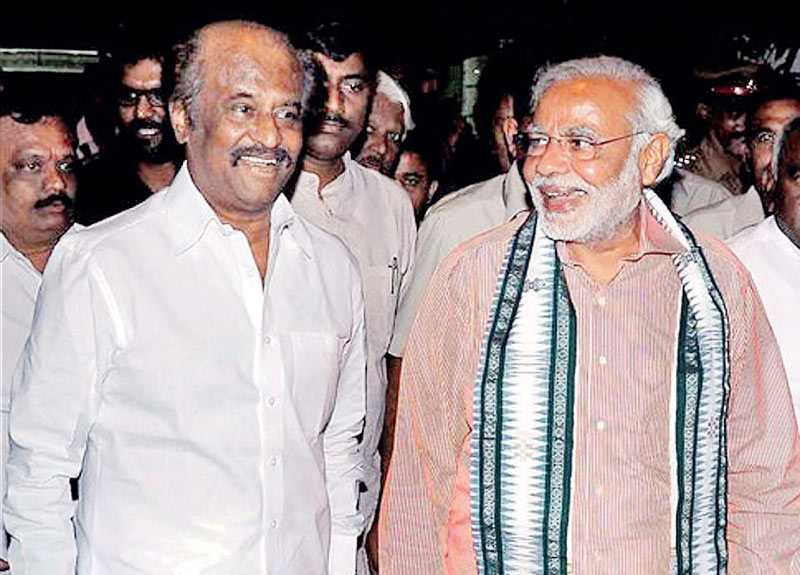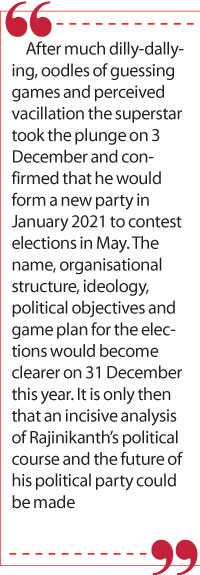Tuesday Feb 24, 2026
Tuesday Feb 24, 2026
Wednesday, 9 December 2020 00:20 - - {{hitsCtrl.values.hits}}

 Tamil Nadu, the Indian State closest to Sri Lanka, is gripped by a great deal of political excitement these days. Tamil Nadu Legislative Assembly elections are due in May 2021. All political parties active in the State – from the ruling All-India Anna Dravida Munnetra Kazhagham (AIADMK/ADMK) to the chief opposition Dravida Munnetra Kazhagham (DMK) – are gearing up in election mode to face polls next year. Polls will be held on the first past the post winner system to 234 Constituencies. One more MLA (Member of Legislative Assembly) will be nominated to represent the Anglo-Indian community.
Tamil Nadu, the Indian State closest to Sri Lanka, is gripped by a great deal of political excitement these days. Tamil Nadu Legislative Assembly elections are due in May 2021. All political parties active in the State – from the ruling All-India Anna Dravida Munnetra Kazhagham (AIADMK/ADMK) to the chief opposition Dravida Munnetra Kazhagham (DMK) – are gearing up in election mode to face polls next year. Polls will be held on the first past the post winner system to 234 Constituencies. One more MLA (Member of Legislative Assembly) will be nominated to represent the Anglo-Indian community.
The advent of a general election always leads to much enthusiasm and anticipation. The forthcoming election however has been enlivened further by an additional factor. The leading Tamil actor Rajinikanth known as “Superstar” has indicated that he would be forming a new political party in January 2021 to face the hustings in May. Rajinikanth has said that the name of the party and its official launch date in January would be announced on 31 December this year. Since Rajinikanth would be celebrating his 70th birth anniversary on 12 December there is speculation that the popular actor may reveal more details about his future political plans on that red letter day ahead of 31 December.
Rajinikanth’s pledge
In keeping with current times where many political leaders and politicians resort to Twitter to make important announcements, the aspiring politician Rajinikanth too made his intention of launching a new party known to the world through tweets. On Thursday 3 December Rajinikanth posted a tweet at the auspicious time of 12.12. In that Tamil language tweet Rajinikanth said: “In the upcoming elections, we will achieve a big victory with the support of the people. A Spiritual politics will emerge in Tamil Nadu that will bring transparency, honesty… a politics with no corruption and one that is free of caste and religious bias.” He further said that “miracles would happen”.
Thereafter media personnel began flocking to the actor’s residence in the upmarket area of Poes Garden in Theynampettai (Teynampet), Chennai. Some hours later Rajinikanth was compelled to conduct an impromptu press conference. It was held in the exterior of his house because of the very large gathering. In that media meet Rajinikanth was very emotional. Rajini – as he is known widely – told journalists that political change was very necessary in Tamil Nadu and that he would only be an instrument of the people to bring about that change. “Political change is very important and the need of the hour. If it doesn’t happen now, it won’t happen ever. Everything needs to be changed.”
He went on to say: “I am just a small instrument. If I win, it is people’s victory. If I lose, it is the people’s loss. I request people to be with me.” Responding to queries about his personal health, the soon-to-be-septuagenarian superstar said: “Everybody knows that I have had a kidney transplant. The natural (body’s) immunity needs to be reduced to enable the body to accept a new organ. However, the body needs immunity to fight COVID-19. This is a big problem. Doctors advised that it was dangerous to meet people and campaign… But then, when I was ill in Singapore, I came back alive because of the prayers of the people. I will be more than happy now if I lose my life for the people. That is why I have decided to take the political party plunge.”
Associated with Rajinikanth at the media conference was the well-known political activist Thamilaruvi Manian and the Bharatiya Janata Party (BJP) Tamil Nadu State Intellectual Cell President R. Arjunamoorthy. Rajinikanth said Thamilaruvi Manan would oversee party matters as a “Maetpaarvaiyaalar” (Supervisor) while Arjunamoorthy would be the lynchpin for party activities as an “Orunginaippaalar” (Coordinator).
Arjunamoorthy has supposedly terminated his links with the BJP after he teamed up with Rajini. His personal relationship with several top BJP leaders at both State and National level continues. The maverick Thamilaruvi Manian who has flirted with several political parties in the past has been functioning as a propagandist for Rajinikanth since 2017. He heads an outfit called the ‘Gandhiya Makkal Iyakkam’ (Gandhian People’s Movement) also.
|
Leading Tamil actor Rajinikanth has indicated that he will be forming a new political party in January 2021 to face the hustings in May
|
Rajinikanth’s key objective
The key objective of Rajinikanth in launching a new political party is political change in Tamil Nadu. Since 1967 the South Indian State of Tamil Nadu has been ruled by political parties subscribing to what is termed as Dravidian ideology.
‘Dravidianism’ in essence espouses economic development, social justice, equality, elimination of caste discrimination, women emancipation, secularism, greater cooperation among South Indian states and a Tamil national consciousness.
In recent times, no non-Dravidian party, neither national nor regional, has been able to rule Tamil Nadu for more than five decades. Even the Congress party of the Gandhis and Nehrus which ruled in Tamil Nadu for 20 years after Independence from 1947 to 1967 has been unable to regain power in the State for the past 53 years. The ‘Dravidian’ political ideology has been ruling the roost in Tamil Nadu. Either the Dravida Munnetra Kazhagham (DMK) or its alternative the All India Anna-Dravida Munnetra Kazhagham (AIADMK) have been enjoying power in the State. Currently the AIADMK is in the saddle but the DMK is strongly tipped to do well in 2021.
It appears therefore that Rajinikanth’s underlying motive in his avowed intention of ushering in change is to dislodge the ‘Dravidan’ parties from the seat of power. This has led to much speculation about Rajinikanth being a witting or unwitting instrument of the Bharatiya Janata Party (BJP). Although India is ruled by the BJP with Narendra Modi as Prime Minister, the Hindu nationalist party has not made an impact in Tamil Nadu. The so-called “Modi wave” is yet to engulf the Dravidian State. As such many suspect Rajinikanth is being used by the BJP to dent ‘Dravidianism’ in Tamil Nadu and accuse the actor of being a Trojan horse.
Rajinikanth’s political importance
The political importance of Rajinikanth is so great in Tamil Nadu that the State’s foremost English newspaper ‘The Hindu’ – much respected nationally and internationally – thought it fit to pen an Editorial on the topic. Here are a few excerpts from ‘The Hindu’ Editorial of 5 December titled ‘Star turn: On Rajinikanth’s party’:
“Regardless of the eventual outcome of Mr. Rajinikanth’s political project, his move has the potential of facilitating the emergence of a credible third force in the State, where all attempts, since 1977, have ended in failure… Very much like M.G. Ramachandran, M. Karunanidhi and J. Jayalalithaa, Mr. Rajinikanth is banking heavily on the intangible asset of charisma. Even some of his poorly made films have made money because of a huge fan following. But this is no guarantor of success in elections in Tamil Nadu… Notwithstanding all the challenges that he may have to face, Mr. Rajinikanth, by stitching up the right combination of political forces and declaring adherence to long-cherished ideals of the State such as a development-oriented all-inclusive approach, welfarism and social justice, can possibly provide a stiff fight to the established players.”
The Hindu Editorial refers to Rajinikanth’s charisma and compares him to M.G. Ramachandran, M. Karunanidhi and J. Jayalalithaa. All three of them were former Tamil Nadu Chief Ministers with a cinematic background. While MG Ramachandran and Jayalalithaa (both from AIADMK) were popular actors, Karunanidhi (from DMK) was a leading screenplay dialogue writer. So huge was Karunanidhi’s appeal that his name used to be displayed at the start when film credits were shown on screen. Viewed against that backdrop, it is very likely that the charismatic appeal of Rajinikanth will help him to do well in electoral politics as in the case of MGR, Karunanidhi and Jayalalithaa.
Rajinikanth’s family background
As stated earlier Rajinikanth will be a septuagenarian on 12 December. Yet the “Superstar,” as he is known, is still the single most popular mass figure among actors in Tamil cinema. Interestingly enough, Rajinikanth, though the most popular actor in Tamil cinema, is ethnically not a Tamil. He is not even a South Indian though born in Bangalore, now known as Bengaluru. Rajinikanth is a Maratha whose family hails from Mavadi Kadepathar in the State of Maharashtra. His given name is Shivaji Rao Gaekwad.
The Gaekwads are of Kshatriya warrior clan lineage. His family moved to Bangalore/Bengaluru in the southern state of Karnataka during the British period. It is now being said that Rajini’s police constable father Ramoji Rao Gaekwad was born in Naachikkuppam near Krishnagiri and that Rajini’s mother Ramabhai was born in a border area of Coimbatore. Both Krishnagiri and Coimbatore are in Tamil Nadu State. It is doubtful whether these claims are correct or simply ‘alternate facts’ aiming to create a ‘Tamil Nadu background’ to the actor for political purposes.
Rajini’s given name at birth Shivaji Rao was derived from the legendary Maratha warrior-king ‘Chatrapathi Shivaji’. Shivaji Rao Gaekwad was born in Bangalore on 12 December 1950. He dropped out of school after completing his secondary education (SSLC) and after doing several odd jobs became a bus conductor. He began acting in Kannada stage plays as a hobby and made quite an impression.
Rajinikanth’s acting journey
Encouraged by colleagues and friends he enrolled at the MGR Government Film and Television Training Institute in Madras now known as Chennai in 1973 for a two year course in acting. He passed out in 1975 and was soon provided a major break by renowned Tamil Film Director K. Balachander, who gave him three minor roles in three consecutive films. Shivaji Rao, renamed as Rajinikanth by the Director, made his film debut playing a very small but significant role in Balachander’s ‘Abhoorva Raagangal’ (Rare Melodies) in 1975.
Balachander continued to give Rajinikanth roles in the Tamil and Telugu films directed by him. Other filmmakers too followed suit. In the early stages Rajinikanth played somewhat negative parts. But gradually he began getting positive roles. Soon he started playing lead roles.
Rajini’s actor journey was from villain to anti-hero to hero. Rajinikanth began captivating film goers with his smart appearance, stylish movements, novel mannerisms, rapid manner of dialogue delivery and a striking penchant for uttering punchy one-liners. His stock began to rise from 1980 onwards and very soon the ex-bus conductor’s movies began breaking box-office records. He was dubbed the “Superstar” of Tamil cinema.
Rajinikanth has in a career spanning more than four decades acted in 167 films. He is currently acting in his 168th film ‘Annaathey’. Over 100 of Rajini’s films were in Tamil but the dusky demi-god has acted in Hindi, Telugu, Kannada and Malayalam movies also. Rajinikanth has acted in one English film, ‘Bloodstone’. Most of his films have been money spinners running to packed houses for weeks and weeks. He is arguably the highest paid actor in Indian filmdom and is reportedly paid over Indian Rs. 60 crore and a share of the profits for a film. Rajinikanth is married to Latha Rangachchaary, a Tamil Brahmin Iyengar woman. They have two daughters, Aishwarya and Soundarya, and three grandchildren.
Rajinikanth’s religious beliefs
Rajinikanth is a devout Hindu and a follower of the philosophy propounded by the miracle-working scholarly Saint Shree Ragavendhra Swami. Not only has Rajini named the wedding hall he owns in Chennai as ‘Ragavendhra Kalyana Mandapam,’ but has also acted as the holy man in his 100th film ‘Sri Ragavendhrar’ released in 1985.
Moreover, Rajinikanth has a custom of withdrawing frequently to the Himalayas and engaging in meditation. He is also a devotee of Shree Sabarimalai Aiyappan hill temple in Kerala. Rajinikanth has never hesitated to speak publicly about his religious and spiritual beliefs. He has also been supportive of the Modi Government at times. This in turn has created an impression – unfairly perhaps – that Rajinikanth is a kindred soul of the ultra-Hindu rightist ‘Hindutva’ school of thought.
Rajinikanth’s political plunge
The current media hype over Rajinikanth’s political plunge may create an impression that the actor is announcing his entry into politics for the first time. That is not so. Rajinikanth’s ‘official’ announcement about entering politics was made three years ago on 31 December 2017. What happened then evokes a sense of déjà vu in the current context.
On 31 December 2017, office-bearer representatives of Rajinikanth›s fan club network were summoned for an important meeting at the wedding hall owned by the actor in T›nagar Chennai – Ragavendhra Kalyana Mandapam. Rajinikanth walked on stage clad in his customary white kurta and pyjama. The hall reverberated with applause, cheers, whistles and shouts of “Thalaivaa” (Leader). Rajini started speaking and within a few minutes came the historic announcement: “Naan Arasiyalukku Varuvathu Uruthi” (My entry into politics is certain). Some relevant excerpts from his announcement speech translated from Tamil into English are given below:
«My entry into politics is certain (Naan Arasiyalukku Varuvadhu Urudhi.) This is the compulsion of the times. In the upcoming State assembly polls, I will start my own political party, and contest in all the 234 constituencies in Tamil Nadu.
«I am not entering politics for money or fame. Politics has become very rotten. Democracy has decayed. The political events of Tamil Nadu in the past year has made every person in Tamil Nadu hang their head in shame. People from every other state are laughing at us.
«At this point, if I don’t take decisive action, the guilt that I did not even attempt to do something good in a democratic manner for the people who have given me life will haunt me till my death. It has to be changed, everything has to be changed. The time for political change has come. System has to be changed. We need truthful, honest, principled, transparent politics, not influenced by caste or religion, we need spiritual politics (Aanmeeha Arasiyal). That is my goal, my desire and my aim.
«We will prepare our army, and right before the State elections, we will launch the party, tell the people our plan of action, tell them what we can do and what we can’t, and if we cannot do what we promised, we will resign within three years. Truth, hard work and progress is our motto. My principle is to think good, speak good, do good, and good things will happen. Our army will be there in the next state assembly elections. Long Live Tamil Nadu, may the Tamil people progress. Jai Hind.»
It could be seen therefore that Rajinikanth is adhering in 2020 December to what he pledged in December 2017. He is launching a party to contest all seats in Tamil Nadu at the next election. He wants change. He wants to change the system. He wants to replace the current scheme of politics with “Aanmeeha Arasiyal” (spiritual politics). It is unclear as to what Rajinikanth means by spiritual politics. Some of his critics say “Aanmeeha Arasiyal” is another form of Hindutva.
A unique feature of the relationship between the movie stars of the Indian south and their fans is the proliferation of fan clubs (Rasikar Mandrangal). The clubs hold annual conventions and also participate in social service projects. “Superstar” Rajinikanth too has an enormous fan club network. So immense was it that the actor stopped sanctioning and ‘officially’ registering fan clubs since 1996-’97. At that time there were over 50,000 fan clubs with a minimum membership of at least 25 each. Though Rajinikanth stopped sanctioning fan clubs since 1997 that has not deterred his rasikas from continuing to form fan clubs. This has resulted in thousands of ‘unofficial’ Rajinikanth fan clubs with millions of members being set up in the past two decades.
The official and unofficial fan clubs together comprise a formidable force. Rajinikanth’s first task after announcing his political entry was the formal regularisation of these fan clubs both official and unofficial into one entity called ‘Rajini Mandram’ (Rajini Forum). New entrants were invited to apply. Rajinikanth streamlining and developing his fan clubs into a single co-ordinated entity indicated that the superstar was emulating former Tamil Nadu Chief Minister MG Ramachandran (MGR) who transformed his fan clubs into party branches when he started his own political party the AIADMK in 1972.
What happened next was rather perplexing. Although the Rajini Forum was a roaring success with millions of members being organised into a viable entity, Rajinikanth did not follow it up effectively. He kept procrastinating indecisively while the Rajini Forum seemed to be in a state of virtual limbo. There came a stage where most people thought that Rajinikanth would never ever enter active politics as announced in 2017.
Finally after much dilly-dallying, oodles of guessing games and perceived vacillation the superstar took the plunge on 3 December and confirmed that he would form a new party in January 2021 to contest elections in May. The name, organisational structure, ideology, political objectives and game plan for the elections would become clearer on 31 December this year. It is only then that an incisive analysis of Rajinikanth’s political course and the future of his political party could be made.
(D.B.S. Jeyaraj can be reached at [email protected])